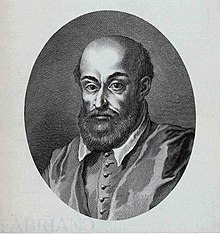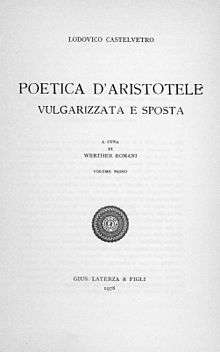Lodovico Castelvetro
Lodovico Castelvetro (ca. 1505–1571) was an important figure in the development of neo-classicism, especially in drama. It was his reading of Aristotle that led to a widespread adoption of a tight version of the Three Unities, as a dramatic standard.

Castelvetro was born in Modena, Italy, and died in Chiavenna.
Works
His Poetica d'Aristotele vulgarizzata e sposta ("The Poetics of Aristotle translated in the Vulgar Language and commented on") was called the most famous Italian Renaissance commentary on Aristotle's Poetics.[1] His supposed involvement in translation of Protestant texts caused him trouble with the Church. He was labelled a heretic in 1557, and lived in exile from his native Italy (he was born near Modena). His Giunta, a commentary on the Prose della volgar lingua by Pietro Bembo, is one of the earlier texts on Italian grammar, and linguistics in general; his contemporaries objected to him that his theories were a little too philosophical for their time.
The polemics with Caro
Castelvetro published some remarks on the language of Annibal Caro which led to some fierce debates; as an outcome of these disputes, a certain Alberigo Longo from Salento was killed, perhaps by the same Castelvetro, because his courage matched his erudition. Benedetto Varchi was involved, albeit reluctantly, in this dispute; he speaks of his involvement in the Ercolano, one of the books which are dearest to the lovers of the Florentine tongue.
Castelvetro contradicts Aristotle on a number of issues. He did not advocate the unity of action, the only unity Aristotle felt to be essential.

References
- Preminger, Alex and T. V. F. Brogan, et al., The New Princeton Encyclopedia of Poetry and Poetics, 1993. New York: MJF Books/Fine Communications
- Andrew Bongiorno (editor and translator), Castelvetro on the Art of Poetry (1984)
- Stefano Jossa, ‘Ludovico Castelvetro between Humanism and Heresy’, in F. De Donno, S. Gilson (eds), Beyond Catholicism : Heresy, Mysticism, and Apocalypse in Italian Culture (New York: Palgrave/Macmillan, 2014), pp. 77-103. ISBN 1137342021